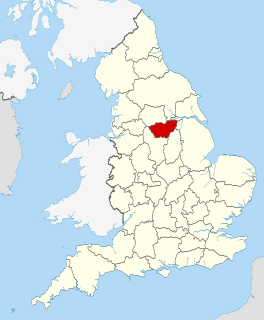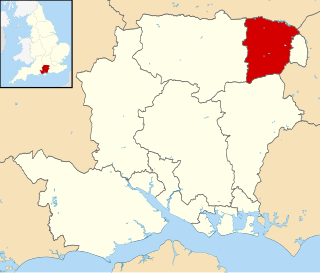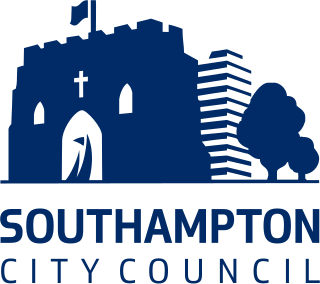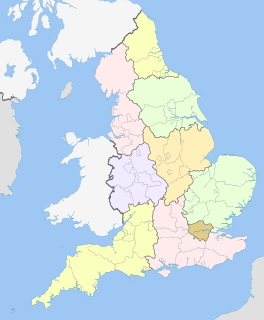NHS East of England was a strategic health authority of the National Health Service in England. It operated in the East of England region, which is coterminous with the local government office region. The authority closed on 31 March 2013 as part of the Health and Social Care Act 2012.

South Yorkshire is a ceremonial and metropolitan county in England. It is the southernmost county in the Yorkshire and the Humber region and had a population of 1.34 million in 2011. It has an area of 1,552 square kilometres (599 sq mi) and consists of four metropolitan boroughs, Barnsley, Doncaster, Rotherham and Sheffield. South Yorkshire was created on 1 April 1974 as a result of the Local Government Act 1972. Its largest settlement is Sheffield.

The subdivisions of England constitute a hierarchy of administrative divisions and non-administrative ceremonial areas.

Hart is a local government district in Hampshire, England, named after the River Hart. Its council is based in Fleet. It was formed on 1 April 1974 under the Local Government Act 1972, as a merger of the urban district of Fleet, and the Hartley Wintney Rural District. It was named the best place to live in the UK in the 2017 Halifax quality of life study.

The regional chambers of England were a group of indirectly elected regional bodies that were created by the provisions of the Regional Development Agencies Act 1998. There were eight regional chambers, one for each of the regions of England except Greater London, which had opted for an elected mayor and assembly in 1998. All eight regional chambers had adopted the title "regional assembly" or "assembly" as part of their name, though this was not an official status in law. The chambers were abolished over a two-year period between 31 March 2008 and 31 March 2010 and some of their functions were assumed by newly established Local authority leaders' boards.

The North East England devolution referendum was an all postal ballot referendum that took place on 4 November 2004 throughout North East England on whether or not to establish an elected assembly for the region. Devolution referendums in the regions of Northern England were initially proposed under provisions of the Regional Assemblies (Preparations) Act 2003. Initially, three referendums were planned, but only one took place. The votes concerned the question of devolving limited political powers from the UK Parliament to elected regional assemblies in North East England, North West England and Yorkshire and the Humber respectively. Each were initially planned to be held on 4 November 2004, but on 22 July 2004 the planned referendums in North West England and in Yorkshire and the Humber were postponed, due to concerns raised about the use of postal ballots, but the referendum in North East England was allowed to continue, particularly as it was assumed that the region held the most support for the proposed devolution.

Southampton City Council is the local authority of the city of Southampton. It is a unitary authority, having the powers of a non-metropolitan county and district council combined. It provides a full range of local government services including council tax billing, libraries, social services, processing planning applications, waste collection and disposal, and it is a local education authority. The council runs a municipal company, 'Southampton Local Authority Trading Company', which covers various public services and until September 2020 ran 'CItizEN', a not-for-profit energy company which was absorbed into British Gas upon their takeover of the licence partner Robin Hood Energy.
Strategic health authorities (SHA) were part of the structure of the National Health Service in England between 2002 and 2013. Each SHA was responsible for managing performance, enacting directives and implementing health policy as required by the Department of Health at a regional level.

The schools in England are organised into local education authorities. There are 150 local education authorities in England organised into nine larger regions. According to the Schools Census there were 3,408 maintained government secondary schools in England in 2017.

Metropolitan and non-metropolitan counties are one of the four levels of subdivisions of England used for the purposes of local government outside Greater London and the Isles of Scilly. As originally constituted, the metropolitan and non-metropolitan counties each consisted of multiple districts, had a county council and were also the counties for the purposes of Lieutenancies. Later changes in legislation during the 1980s and 1990s have resulted in counties with no county council and 'unitary authority' counties with no districts. Counties for the purposes of Lieutenancies are now defined separately, based on the metropolitan and non-metropolitan counties.
South East England Regional Assembly (SEERA) was the regional chamber for the South East England region. Regional Chambers were established by the Regional Development Agencies Act 1998 and their function of consultation was shown in Section 8 of the Act. It was based at Guildford until it was dissolved on 31 March 2009, with its functions being assumed by the South East England Partnership Board, which comprises members of SEEDA board, the Regional Development Agency and the South East England Leaders’ Board, the executive body of South East England Councils.
Health regions, also called health authorities, are a governance model used by Canada's provincial and territorial governments to administer and deliver public health care to all Canadian residents.

Central Alberta is a region located in the Canadian province of Alberta.

Luton Borough Council is the local authority of Luton, England. It is a unitary authority, having the powers of a non-metropolitan county and district council combined. It is a member of the East of England Local Government Association.

Watford Borough Council is the local authority for the Watford non-metropolitan district of England, the United Kingdom. Watford is located in the south-west of Hertfordshire, in the East of England region. The council is based in the Town Hall on Hempstead Road.

The regions, formerly known as the government office regions, are the highest tier of sub-national division in England, established in 1994. Between 1994 and 2011, nine regions had officially devolved functions within government. While they no longer fulfil this role, they continue to be used for statistical and some administrative purposes. While the UK was a member of the European Union, they defined areas (constituencies) for the purposes of elections to the European Parliament. Eurostat also used them to demarcate first level Nomenclature of Territorial Units for Statistics (NUTS) regions within the European Union, which in 2021 were superseded by International Territorial Level (ITL) regions. The regions generally follow the boundaries of the former standard regions, established in the 1940s for statistical purposes.

Greater London is an administrative area governed by the Greater London Authority, and a ceremonial county of England that covers the bulk of the same area, with the exception of the City of London. It forms the London region. Greater London is the administrative boundary for London, and is organised into 33 local government districts: the 32 London boroughs and the City of London, which is part of the region but forms a separate ceremonial county. The Greater London Authority, based in Newham as of the start of 2022, is responsible for strategic local government across the region and consists of the Mayor of London and the London Assembly.

The Cities and Local Government Devolution Act 2016 is an Act of the Parliament of the United Kingdom designed to introduce directly elected mayors to combined local authorities in England and Wales and to devolve housing, transport, planning and policing powers to them. The bill was introduced to the House of Lords by Baroness Williams of Trafford, the Parliamentary Under Secretary of State for Communities and Local Government, on 28 May 2015.